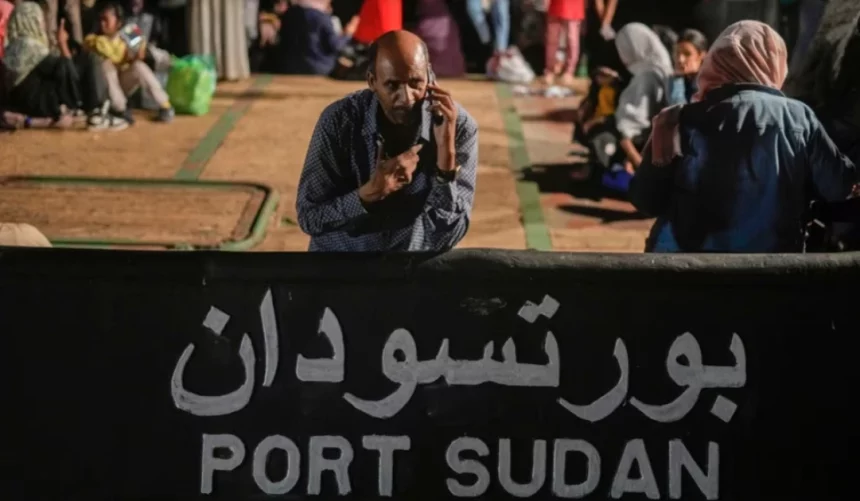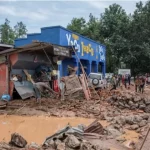In Sudan, heavy fighting was reported in and around the capital Khartoum early Thursday, despite a weeklong cease-fire agreed to by both sides in the conflict.
Sudan’s army and the paramilitary Rapid Defense Forces each appeared to be trying to push the other out of central Khartoum and control areas around the presidential palace and army headquarters.
In Washington, U.S. President Joe Biden deplored the continuing violence. He imposed sanctions to block any Sudanese who are impeding the push to democracy in the northeast African country from carrying out financial transactions linked to any U.S. accounts or property they may hold.
also read
Mudslides in Rwanda kill at least 130
Wuhan citizen journalist who documented COVID outbreak released after three years detained
Eight school staff shot dead in northern Pakistan
“The violence taking place in Sudan is a tragedy—and it is a betrayal of the Sudanese people’s clear demand for civilian government and a transition to democracy,” Biden said in a statement.
“This violence, which has already stolen the lives of hundreds of civilians and began during the holy month of Ramadan, is unconscionable. It must end.”
U.N. Secretary-General Antonio Guterres appealed Wednesday for an end to the fighting in Sudan and international support for the Sudanese people, who he said are facing a humanitarian catastrophe.
“Aid must be allowed into Sudan, and we need secure and immediate access to be able to distribute it to people who need it most,” Guterres said during a news conference in Nairobi, Kenya.
“Civilians and civilian infrastructure must be protected, and humanitarian workers and their assets must be respected.”
Sudan’s Health Ministry says more than 500 people have been killed and nearly 5,000 wounded since the fighting began April 15, during a power struggle between the leaders of the Sudanese government forces and the paramilitary Rapid Support Forces.
The U.N. migration agency (IOM) said this week that at least 334,000 people have been internally displaced by the fighting, in addition to the 100,000 who have fled the country.
The U.N. refugee agency has warned the fighting could cause more than 800,000 people to flee the north eastern African country.
Many are going to the seven countries that border Sudan, including Chad, South Sudan, the Central African Republic, Egypt and Ethiopia.
Latest cease-fire efforts
South Sudan’s Foreign Ministry announced Tuesday that Sudanese army chief General Abdel Fattah al-Burhan and General Mohamed Hamdan Dagalo, head of the paramilitary Rapid Support Forces, had agreed to the new cease-fire.
The U.N. chief expressed concern that previous cease-fires have consistently been violated, and he urged the international community to press the two generals to respect and implement the latest one.
South Sudanese President Salva Kiir stressed the importance of a longer truce and the naming of envoys to peace talks, to which both sides agreed.
Egyptian President Abdel Fattah el-Sisi said his government would support talks in Sudan between the rival factions, adding he is “being careful about not interfering in their domestic matters.”
“The entire region could be affected,” he said in an interview Tuesday with a Japanese newspaper, as an envoy from Sudan’s army chief met with Egyptian officials in Cairo.
Humanitarian operation
U.N. humanitarian chief Martin Griffiths spent Wednesday in Port Sudan — the Sudanese Red Sea city where the U.N. and many nongovernmental organizations have shifted their operations from Khartoum.
Griffiths and the head of the U.N. in Sudan, Volker Perthes, spoke by phone with al-Burhan and Dagalo.
Griffiths told reporters he is working on getting commitments from the two factions to protect humanitarian assistance and allow aid workers and supplies to move, even when there is no formal cease-fire.
“We will need to have agreements at the highest level and very publicly, and we will need to deliver those commitments into local arrangements that can be depended on,” he said, emphasizing that the humanitarian community is “staying and delivering.”
Most aid operations have been suspended or severely scaled back due to the insecurity. Several aid workers have been killed in the fighting.
The Norwegian Refugee Council said Wednesday that one of their Sudanese volunteers was killed Sunday in the volatile city of Geneina in West Darfur.
Looting also has hampered aid operations.
The World Food Program said Wednesday that nearly 17,000 tons of food had been stolen from its warehouses across Sudan, and it was working to determine what supplies remain.
Before the fighting, WFP had more than 80,000 tons of stocks in the country. The agency still plans to provide food assistance for 384,000 people in the coming days.
The U.N. refugee agency’s Darfur coordinator said looting has long been a problem in Darfur, and many of their facilities have been robbed since April 15.
“Our facilities in Nyala, in South Darfur, and in El Geneina, in West Darfur, have been targeted by looters, criminals, bandits, out of control militias,” Toby Harward told reporters in a video call from Nairobi, where he was evacuated last week.
He said local authorities in Darfur have been working with humanitarians to try to make sure the various national cease-fires are respected at the local level, so aid can be distributed.
The International Federation of Red Cross and Red Crescent Societies said Thursday it has launched an emergency appeal to support the Sudanese Red Crescent Society to deliver assistance to 200,000 people.



